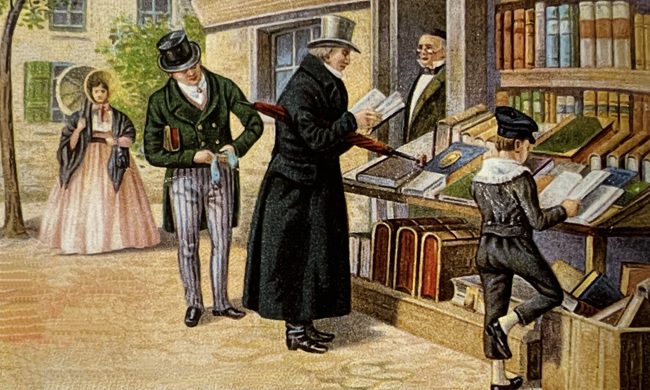Apr 14, 2025
Apr 14, 2025
As was seen in the previous chapter, the colorful tapestry of French literature during the reign of Louis XIV was woven by number of authors reflecting the colors of ideals, order, reason, and clarity, while exploring themes of love, ambition, morality, and human nature. But the questions which arose for dissemination were how were the reception of the readers? Did they support the views of the authors’ whole heartedly or did they oppose? What role did the censorship, which was imposed on the authors, play? To which direction did the public mind head forming their opinions about the literary pursuits of the authors?

Readers:
There was a sudden rise in the figure of readers who wished to read. Possessing a book was considered a status symbol even though public libraries were abundant. Reading rooms sprang up in every nook and corner of the country and the practice of reading aloud and then holding discussion on the same became a thing called “de rigueur”. The people earlier read almanac and biographies of Gods and Saints now had an overabundance of dishes in front of them to satisfy their intellectual taste buds. Reading rooms charged hefty fees but the enthusiasm for reading made the rooms go house full. Lending books between individuals made those individuals to be considered as representatives of the high echelons of the society. Spending time in public libraries was considered intellectual hobby. Some of the illustrious public libraries in 18th century were:
Bibliothèque Mazarine – The oldest public library in France, established by Cardinal Mazarin (1602–1661) who served as the Chief Minister of France under King Louis XIV from 1642 until his death in 1661.
Bibliothèque Sainte-Geneviève – A monastic library when opened, became accessible to all, turning into a major intellectual hub in Paris.
Bibliothèque du Roi (later Bibliothèque Nationale de France) – The Royal Library, expanded under Louis XV and became one of the most significant collections in Europe.
Bibliothèque de l'Arsenal – Initially a private collection, it became a public library under the French Revolution.
Bibliothèque Municipale de Lyon – Library in Lyon, one of the important cities of France, holds important manuscripts and books.
These libraries were instrumental in spreading Enlightenment ideas, especially after the French Revolution, when many private and priestly collections were nationalized. The trend in reading material diversified in a way that religious literature lost its sheen. The new interest was love themes, world history, science and arts, and what the French call, Les belles-lettres.
Censorship:
To publish under absolute monarchy was to publish in a censorship system. At the very beginning a royal committee of censorship was formed which decided whether the book qualified to be censored. The consent to publish was considered to be a royal privilege, called permission. In many cases the books did not get a privilege but were still allowed to be published were termed as a "tacit permission".
Censorship made the authorization of a work conditional on the deletion or modification of certain passages. The Parliament of Paris had this power, and theologians, who carefully examined it to see it did not infringe on religion. Censorship was to identify those who could undermine the monarchy’s three great pillars: The King, the Church and morality. Another important agency for censorship was Sorbonne, which was founded in 1257 by Robert de Sorbonne, the chaplain of King Louis IX (Saint Louis), as a theological college for poor students. In the 17th and 18th centuries, the Sorbonne remained a hub of theological and philosophical thought, often linked with the Catholic Church. But the beauty was even after books’ publication, other institutions could still condemn a book. The Parliament of Paris had given this power to the people to come forward and criticize on the content of the books.
Throughout the 18th century, especially in its second half, people debated how censorship should work. They asked questions like: How can we decide on an unsafe book? Should a book be banned just because it might be hurtful? There were also concerns about how to ban books effectively. Censorship often led to secret networks, making banned books even more desirable. If censored books still circulated, was banning them useful? French author Diderot, in his Lettre sur le commerce de la librairie, pointed out these contradictions. He noted that banning books only drew more attention and also harmed authors, as it made their works easier to counterfeit leading to loss of their remuneration.
The Public Mind:
Public opinion underwent a major shift at the end of the ancient regime, changing how people determined authority. Before the 18th century, "public opinion" was mainly about an individual's reputation. However, it became politicized, transforming into a force that could judge and influence governance leading a way for a gradual beginning of democratic form of governance. Monarchy went on to understand it by gauging popular sentiment, including feelings towards authors and writers which in many instances were not always logical.
Simultaneously, thinkers like philosophers and lawyers began to see public opinion as a legitimate authority, a rational voice capable of judging legal and political matters. They acknowledged the power of the common person's thoughts, even without direct political power. This shift was connected to the secularization of the era, where traditional religious authorities lost influence. As religious authority declined, public opinion emerged as a new standard for truth and justice, promoting a shared, logical understanding aligned with Enlightenment ideals. Public opinion became an “add value” factor.
Image (c) istock.com
08-Feb-2025
More by : Dr. Satish Bendigiri